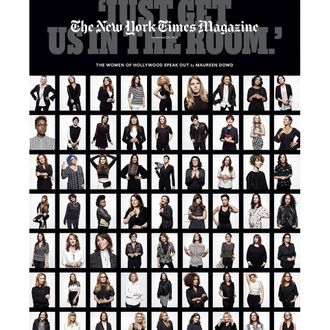
You’ve heard the depressing statistics about Hollywood’s female-director problem: Women made up less than 2 percent of the directors of last year’s top films, and things aren’t much better in TV, where only 18 percent of first-time directors were female. But who’s to blame for this depressing state of affairs? As you might suspect from a systemic issue, you won’t get one easy answer. In this week’s New York Times Magazine, Maureen Down goes deep on Hollywood sexism and finds a variety of fingers being pointed every which way.
In the boardrooms themselves, progressive-minded executives say their hands are tied by the realities of the blockbuster business: International markets want big, loud action films, and they want them to be made by men. “The moment you mention it’s a female director to foreign companies, you can see the eyes roll,” an anonymous female studio head tells Dowd. “Buyers want action films, and they don’t see women as action directors.” Even female characters are a hard sell: As Paul Feig says, “We can’t get Spy released in Japan. Russia has tended to be resistant to female leads.”
And, quietly, many in Hollywood — from studio heads to male directors — think women simply haven’t gravitated to the types of films that pull in big money. “Until I waved the flag at the Fortune women’s conference recently, I had not had one single phone call from a woman telling me that she really, really wants to direct a Star Wars movie,” Lucasfilm head Kathleen Kennedy said. (Men are directing every film in the new Star Wars trilogy, as well as the spinoff Rogue One and the Han Solo prequel.) “They need to be the ones picking up the phone and saying, ‘Hey, let me tell you what Star Wars means to me, and how much I could do with it.’”
Unsurprisingly, female filmmakers aren’t buying it. Across the board, they point to male executives simply being unwilling to consider a female point of view. Says one anonymous woman: “When male Hollywood executives make decisions, they are in touch with their 15-year-old self — that’s who they’re making movies for.” Or, in the words of Miranda July: “There’s this ickiness associated with women that I think is the real misogyny always at the edge of things … There’s a fear, when women make things, not just that it’s going to be a flop but that it’s going to be annoying and embarrassing and somehow incriminating.”
And even when those executives are women, female filmmakers say they’re often unwilling to work in solidarity with other women. Lena Dunham compares it to a life raft:
I believe a lot of these women were like, “I’m here, I worked my ass off to get this job and I’m not gonna make hiring women directors my mission because then I’m going to get [expletive censored by the squeamish Times] fired. And I need to make a difference. This is how I can make a difference, by being the woman who has this job.” It’s the metaphor of: You are on a raft, you got away from the sinking ship, are you gonna pull everyone onto the raft with you? What if that sinks your raft and you all die?
No matter the cause, the solution remains the same: Hire more women. Hire more women. Hire more women. Here’s a list of where to start.


